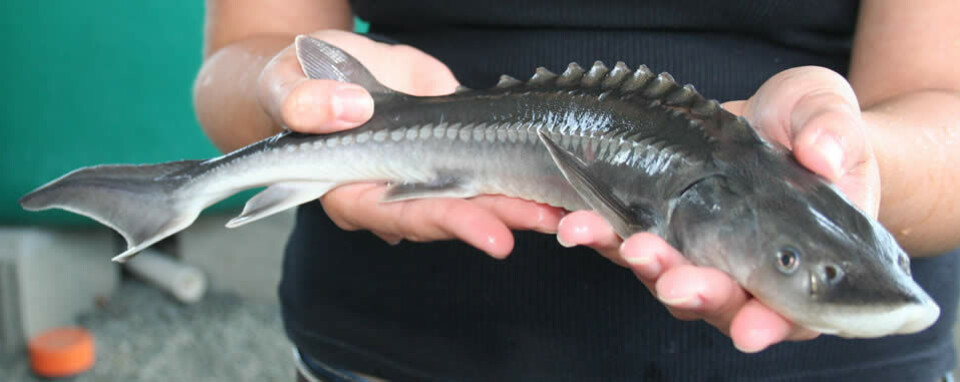
A taste of the prehistoric
The International Centre for Sturgeon Studies on Vancouver Island grows white sturgeon for research and conservation purposes and has recently delved into the sustainable seafood market.
Vancouver Island University (VIU) has been raising white sturgeon since 1984. In 2012, the University launched the only dedicated research facility for studying the prehistoric fish – the only one of its kind in North America. Named the International Centre for Sturgeon Studies (ICSS), the facility focuses on researching sturgeon biology, conservation and aquaculture applications.
Raised sustainably at Vancouver Island University’s International Centre for Sturgeon Studies (ICSS), a select few of our sturgeon are now being smoked locally and canned at St Jean’s Cannery and Smokehouse.
The ICSS raises thousands of sturgeon every year, but once they reach two years old, fish densities need to be reduced as fish require more room to grow. Because of federal and provincial laws, releasing the fish into the wild is not an option. Selling sturgeon products is an innovative way for the self-funded facility to supplement grant funding.
And not only does the generated revenue help subsidize research and educational activities, but the products are raising awareness about sturgeon aquaculture and conservation.
Partnering with local retailers
So far three restaurants – the Westwood Bistro in Nanaimo, Pacific Prime Restaurant and Lounge in Parksville and Edible Canada in Vancouver – are serving up VIU sturgeon products to customers. Additionally, cans of smoked sturgeon – processed and smoked locally at St Jean’s Cannery and Smokehouse – are available at several local retail shops.
“Our sturgeon are grown in a land-based, closed-containment, re-circulating system which is used for training our fisheries and aquaculture students, so there’s a local, environmentally friendly, educational aspect to it,” said Dr Jenny Dawson-Coates, a Fish Health Biologist at VIU.
“It’s also a really nice fish for eating. In other places in the world, it’s a delicacy.”
Islanders who want to try sturgeon can look for VIU smoked canned sturgeon at several local retailers. For inspiration, they can also visit the restaurants mentioned above to see what chefs are doing with both the smoked and fresh fish.
Ian Lane, Pacific Prime Restaurant’s Food and Beverage Director in Parksville, BC, has used VIU’s fresh sturgeon fillets as the restaurant’s featured Catch of the Day a number of times.
“Sturgeon is a great, underutilized fish,” said Lane. “Because it is a sustainable, ethical, local product, we thought it was a great fit for what we want to do at this restaurant.”
At Nanaimo-based Westwood Bistro, guests can sample the smoked product in a risotto-filled crepe with yam cream, and the fresh fillets make an appearance on special menus from time to time. Head Chef Kellie Callender says the major appeal of VIU sturgeon is that it is a unique, interesting, local product, and all the money goes back into research and education. He’s also heard many positive things about the taste of the product.
“Whenever I talk to guests after they’ve had it, they’re usually really excited to hear where it’s from,” said Callender. “We try to support local farmers and producers as much as possible and that whole message really changes how people feel about coming out to eat.”
On Granville Island in Vancouver, Edible Canada is serving up VIU sturgeon in a seafood salad.
“At Edible Canada, we are synonymous with sourcing only the best local, sustainable and seasonal products, and this was a great way for us to not only help the research program, but also offer our customers an opportunity to enjoy a unique fish that showcases the best of BC and is unsung on most local menus,” says Eric Pateman, President of Edible Canada Culinary Experiences Corporation. “Our customers love it for its firmness and flavour.”
Debbie Shore, Chair of VIU’s Culinary Programs, who has cooked with it a number of times, also enjoys the taste.
“It’s juicy and has a good texture and a really nice flavour,” she says. “Anytime I’ve cooked with it, comments have been positive, and people have really liked it.”
White sturgeon – the largest sturgeon species in North America – can grow up to six metres long and can live up to 100-150 years old.
The ICSS brings together research activities at the regional, national and international levels involving conservation, enhancement and commercial interests. It is also a place where people can go to learn more about these unique “living fossils” – the ICSS hosts more than 1,000 visitors each year.























































